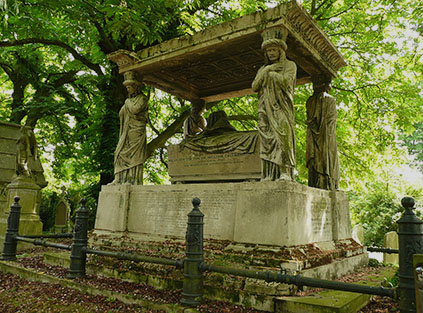Latest Book
The Art of Memory ~ Sculpture in the Cemeteries of London
Richard Barnes
With an Introduction by James Stevens Curl: A Short History of the Cemetery Movement
240pp, 230 col illus, p/b, May 2016
ISBN: 978-1-872914-44-2. £44

LONDON is a city of sculpture, with monuments, statues and carved detail at
every turn. There is another tier however, a much larger quantity of sculptures
of disparate quality, many of which are religious or funereal in nature. These
are located in over 100 cemeteries in and around the great capital – from
Kensal Green, Brompton and Highgate to Lewisham, Chingford and Hendon. Among
the many memorials are works by artists of high esteem, yet these have been
omitted in recent and continuing researches in the History of British Sculpture.
The book begins with an Introduction by the eminent architectural historian,
James Stevens Curl, who has made the subject of cemeteries his domain. His contribution,
A Short History of the Cemetery Movement, provides the context for memorial sculptures
to follow, taking the reader from the days of overrun churchyards to Elysian
promenades among memorials inside the new cemeteries.
The main part of The Art of Memory – Sculpture in the Cemeteries of London
is a series of essays by Richard Barnes, (illustrated by large colour photographs
taken partly by the author, but mostly by the artist and ecclesiologist, Charles
Slade). Of many books about cemeteries this is the first to consider the history
of sculpture: texts are biased to a sculptural perspective, combining descriptions
of design, biographies and memorials' origins with accounts of commissions,
associated works, damage and repairs. The list of British sculptors involved
includes Gilbert Bayes, Edward Burne-Jones, Alfred Gilbert, Barbara Hepworth
(whose 1950 memorial to her first gallery dealer had not been previously recognised),
Edward Onslow Ford, William Reid Dick and Alfred Toft. Added to the list are
foreign artists such as Edouard Lanteri and Carlo Marochetti who lived in London
and influenced British sculpture, and others such as Ernst Barlach, whose works
arrived for other reasons.
The selection includes 'the pick of the best' in terms of sculptural interest
and, once the essays are in chronological sequence, offers a credible history.
This begins with Ducrow's 1837 tomb in Kensal Green, following plans by a designer
of circus spectacles. In contrast, the nearby memorial of Robert Sievier for
his own family shows the work of an academy-schooled sculptor. Other memorials
featured gothic details copied from churches and relying on the mason's traditional
skills. A variety of revivals were enacted with Renaissance effigies, Egyptian
tombs and Venetian mosaic surfaces. Early Medievalism appeared in Brompton with
the unique Leyland memorial by the PRB artist Edward Burne-Jones. After revivalism
came innovation with reflections of art Nouveau and the Arts and Crafts Movement.
Works from the 'New Sculptors' entered the cemeteries with memorials by George
Frampton, William Goscombe John, and Alfred Gilbert, each of whom were knighted
for services to sculpture. Nearly half the selected memorials involve images
of women – as daughters, mothers, mourners and angels of every sort. A
tenth of the works featured in the book were made by women, a much higher ratio
than in other spheres of public sculpture.
Every memorial had been figurative until the 1930s. The first to break the mould
was Alfred Gerrard, sculptor of the three items at the Putney memorial of J.B
Ismay, chairman of the White Star Line and aboard RMS Titanic on the fateful
night. Modernism arrived in 1950 with an almost unknown sculpture by Barbara
Hepworth at the St Marylebone Cemetery grave of her gallery dealer, Duncan MacDonald.
Once again this imprint seeks to fill a gap in our knowledge and appreciation
of British Sculpture. We are in a period of post-Betjeman 'Cemetery re-discovery'
and by publishing The Art of Memory – Sculpture in the Cemeteries of London
Frontier aims to bring significant works to the attention of art historians before
any more damage or loss (such as the theft at the grave of the sculptor William
Goscombe John) can occur.
Illustration: Pl.20 Memorial to Major-General Sir William Casement c.1846,E. and M. Lander monumental masons, Kensal Green Cemetery © C.Slade